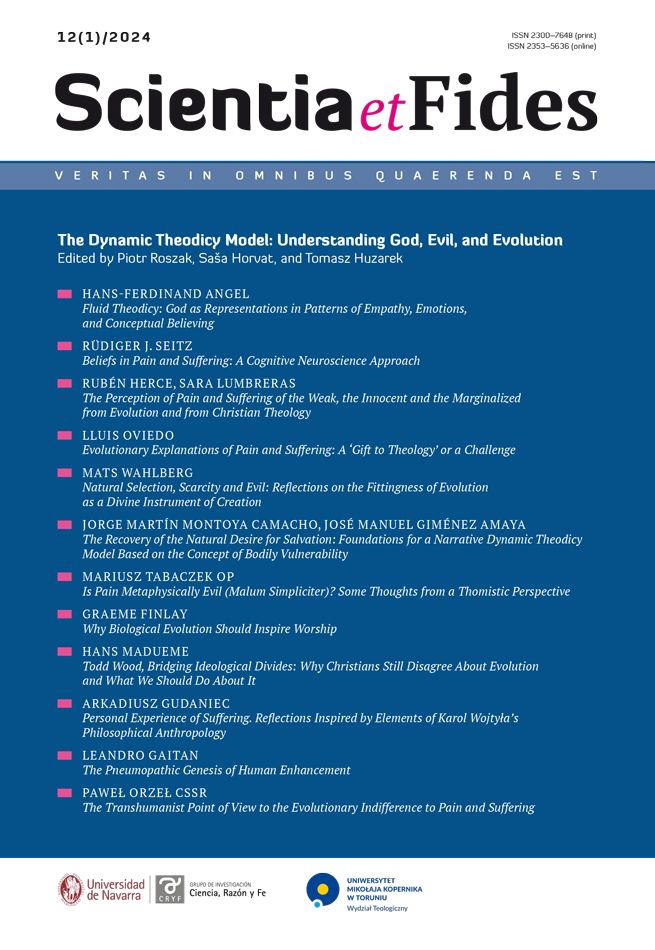Why Biological Evolution Should Inspire Worship
DOI:
https://doi.org/10.12775/SetF.2024.009Słowa kluczowe
endogenous retrovirus, transposable element, comparative genomics, randomness, creation, worshipAbstrakt
The theory of biological evolution has often provoked disagreement, which has frequently been divisive and counterproductive. At other times this scientific paradigm has been discussed with an apologetic intent, to explain why the science of biology and the theology of creation cannot be seen to be mutually exclusive. This paper urges Christians to move decisively to a third type of discourse. The new field of comparative genetics has provided conclusive evidence that biological evolution has given rise to the diversity of living forms, including human beings. Consequently, Christians should, with confidence, gladly accept the evolutionary paradigm and look upon evolution as a divinely ordained historical process that develops through random (stochastic, free) process, but that leads to a divinely purposed consummation. As a result, biological history in its freedom but directedness to God’s final purposes should elicit wonder. People who have come to faith in the God revealed redemptively in Jesus should uninhibitedly offer adoration and praise for evolutionary fruitfulness. Worship should characterise the human response to biological history.[1]
[1] In appreciation of Professor Tom McLeish FRS, scientist, teacher, theologian.
Bibliografia
Alexander, Denis, ed. 2019. Has Science Killed God? London: SPCK.
Alvarez-Carretero, Sandra, Asif U. Tamuri, Matteo Battini et al. 2022. “A specieslevel timeline of mammal evolution integrating phylogenomic data.” Nature 602: 263–67. https://doi.org/10.1038/s41586-021-04341-1.
Amici, David R., Harun Cingoz, Milad J. Alasady et al. 2023. “The HAPSTR2 retrogene buffers stress signaling and resilience in mammals.” Nature Communications 14: article 152. https://doi.org/10.1038/s41467-022-35697-1.
Ashby, Roland, Chris Mulherin, John Pilbrow, and Stephen Ames, eds. 2018.
A Reckless God? Currents and Challenges in the Christian Conversation with Science. Reservoir Victoria: ISCAST Nexus.
Briggs, Andrew, Hans Halvorson, and Andrew Steane. 2018. It Keeps Me Seeking. Oxford: Oxford University Press.
Brooke, John Hedley. 1991. Science and Religion. Cambridge: Cambridge University Press.
Brueggemann, Walter, 1997. Theology of the Old Testament. Minneapolis: Augsburg.
Collins, Francis S. 2006. The Language of God. New York: Free Press.
Conway Morris, Simon. 2015. The Runes of Evolution. Conshohocken: Templeton.
Du, Alan Y., Xiaoyu Zhuo, Vasavi Sundaram et al. 2022. “Functional characterization of enhancer activity during a long terminal repeat’s evolution.” Genome Research 32: 1840–51. https://doi.org/10.1101/gr.276863.122.
Du, Cui, Jing Jiang, Yuzhuo Li et al. 2023. “Regulation of endogenous retrovirus–derived regulatory elements by GATA2/3 and MSX2 in human trophoblast stem cells.” Genome Research 33: 197–207. https://doi.org/10.1101/gr.277150.122.
Falcke, Heino, 2021. Light in the Darkness. London: Wildfire.
Finlay, Graeme. 2022. God’s Gift of Science. Eugene, OR: Wipf and Stock.
Foley, Nicole M., Victor C. Mason, Andrew J. Harris et al. 2023. “A genomic timescale for placental mammal evolution.” Science 380: eabl8189. https://doi.org/10.1126/science.abl8189.
Hanes, Jonathan M. 2021. Review of “The Bible & Ancient Science: Principles of Interpretation” by Denis O. Lamoureux, https://iscast.org/reviews/reviewof-the-bible-ancient-science-principles-of-interpretation-by-denis-o-lamoureux/.
Harrison, Peter. 2021. “Religion and the rise of science.” https://www.faraday.cam.ac.uk/wp-content/uploads/2021/03/Faraday-Paper-21-Harrison-web.pdf.
Hutchings, David, and Tom McLeish. 2017. Let there be Science. Oxford: Lion.
Jeeves, Malcolm, ed. 2011. Rethinking Human Nature. Grand Rapids: William B. Eerdmans.
Kuderna, Lukas F.K., Hong Gao, Mareike C. Janiak et al. 2023. “A global catalog of whole-genome diversity from 233 primate species.” Science 380: 906–13. https://doi.org/10.1126/science.abn7829.
McLeish, Tom. 2014. Faith and Wisdom in Science. Oxford: Oxford University Press.
McLeish, Tom, 2020. “Evolution as an unwrapping of the gift of freedom.” Scientia et Fides 8, no. 2: 43–64. https://doi.org/10.12775/SetF.2020.014.
Naesens, Leslie, Santoshi Muppala, Dhiraj Acharya et al. 2022. “GTF3A mutations predispose to Herpes Simplex encephalitis by disrupting biogenesis of the host-derived RIG-I ligand RNA5SP141,” Science Immunology 7: eabq4531.https://doi.org/10.1126/sciimmunol.abq4531.
Nikaido, Masato, Hidenori Nishihara and Norihiro Okada. 2022. “SINEs as credible signs to prove common ancestry in the tree of life: a brief review of pioneering case studies in retroposon systematics.” Genes 13: 989. https://doi.org/10.3390/genes13060989.
Osborn, Lawrence. 1993. Guardians of Creation. Leicester: Apollos.
Phillips, Rob. 2021. “Schrodinger’s What is Life? at 75.” Cell Systems 12: 465–76.
Polkinghorne, John. 2004. Science and the Trinity. Oxford: Oxford University Press.
Pontis, Julien, Cyril Pulver, Christopher J. Playfoot et al. 2022. “Primate-specific transposable elements shape transcriptional networks during human development.” Nature Communications 13: 7178. https://doi.org/10.1038/s41467-022-34800-w.
Rodriguez-Martin, Bernando, Eva G. Alvarez, Adrian Baez-Ortega et al. 2020. “Pan-cancer analysis of whole genomes identifies driver rearrangements promoted by LINE-1 retrotransposition,” Nature Genetics 52: 306–19. https://doi.org/10.1038/s41588-019-0562-0.
Rolston, Holmes IIII. 1999. Genes, Genesis and God. Cambridge: Cambridge University Press.
Rowley, Paul A., Aisha Ellahi, Kyudong Han et al. 2021. “Nuku, a family of primate retrocopies derived from KU70.” G3: Genes, Genomes, Genetics 11: jkab163.https://doi.org/10.1093/g3journal/jkab163.
Rudwick, Martin J.S. 2014. Earth’s Deep History. Chicago: University of Chicago Press.
Steane, Andrew. 2014. Faithful to Science. Oxford: Oxford University Press.
Wagner, Roger and Andrew Briggs. 2016. The Penultimate Curiosity. Oxford: Oxford University Press.
White, Robert S. 2022. Natural Disasters and Human Responsibility, https://www.faraday.cam.ac.uk/wp-content/uploads/2022/02/Faraday-Paper-25-Whitev4.pdf.
Wright, N.T. 2014. Surprised by Scripture. London: SPCK.
Wright, N.T. and Michael F. Bird. 2019. The New Testament in its World. London: SPCK.
Pobrania
Opublikowane
Jak cytować
Numer
Dział
Licencja
Prawa autorskie (c) 2024 Graeme

Utwór dostępny jest na licencji Creative Commons Uznanie autorstwa – Bez utworów zależnych 4.0 Międzynarodowe.
CC BY ND 4.0. Posiadaczem prawa autorskiego (Licencjodawcą) jest Autor, który na mocy umowy licencyjnej udziela nieodpłatnie prawa do eksploatacji dzieła na polach wskazanych w umowie.
- Licencjodawca udziela Licencjobiorcy licencji niewyłącznej na korzystanie z Utworu/przedmiotu prawa pokrewnego w następujących polach eksploatacji: a) utrwalanie Utworu/przedmiotu prawa pokrewnego; b) reprodukowanie (zwielokrotnienie) Utworu/przedmiotu prawa pokrewnego drukiem i techniką cyfrową (e-book, audiobook); c) wprowadzania do obrotu egzemplarzy zwielokrotnionego Utworu/przedmiotu prawa pokrewnego; d) wprowadzenie Utworu/przedmiotu prawa pokrewnego do pamięci komputera; e) rozpowszechnianie utworu w wersji elektronicznej w formule open access na licencji Creative Commons (CC BY-ND 3.0) poprzez platformę cyfrową Wydawnictwa Naukowego UMK oraz repozytorium UMK.
- Korzystanie przez Licencjobiorcę z utrwalonego Utworu ww. polach nie jest ograniczone czasowo ilościowo i terytorialnie.
- Licencjodawca udziela Licencjobiorcy licencji do Utworu/przedmiotu prawa pokrewnego nieodpłatnie na czas nieokreślony
PEŁEN TEKST UMOWY LICENCYJNEJ >>
Statystyki
Liczba wyświetleń i pobrań: 694
Liczba cytowań: 0



